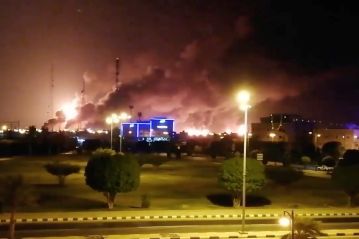RIYADH, Sept 19 (NNN-AGENCIES) – For years, Saudi Arabia has been a major buyer of U.S.-made weapons. That relationship intensified after President Trump took office, with the American leader pushing oil-rich Riyadh to buy more weapons and Saudi Arabia pledging a purchase of $110 billion in U.S. arms just months after his inauguration.
After this weekend, when a devastating attack on Saudi oil facilities blindsided the kingdom, some observers were left wondering what protection Riyadh’s outreach to the United States has bought it.
Notwithstanding the expensive military hardware purchased by Saudi Arabia, experts say, the Saturday attack represented an unusually well-planned operation that would have been difficult for even the most well-equipped and experienced countries to detect and neutralise.
The attack has been claimed by Houthi insurgents in Yemen, where a Saudi-led coalition has been staging a troubled intervention since 2015. U.S. officials have suggested that at least part of the attack was launched from Iran, Saudi Arabia’s rival across the Persian Gulf.
The operation appeared to circumvent the defences of Saudi Arabia’s military, including the six battalions of Patriot missile defence systems, produced by U.S. defence contractor Raytheon — each of which can cost in the region of $1 billion.
Russian President, Vladimir Putin, responded to Saturday’s attack with mockery. At an event, Monday in Turkey, Putin suggested that Saudi Arabia buy the Russian-made S-300 or S-400 missile defence system, as Iran and Turkey had done. “They will reliably protect all infrastructure objects of Saudi Arabia,” Putin said.
The S-400 system is untested in real-life situations, but it costs less than the Patriot system and has technical features that are, on paper at least, an improvement on the U.S. system, including a longer range and the ability to operate in any direction.
There is no evidence that the S-400, if deployed, could have handled Saturday’s incident better than the Patriot system. Even the best missile defence system cannot have a 100 percent success rate; shooting a moving target out of the sky is fundamentally difficult, requiring considerable speed and accuracy.
When Saudi officials claimed to have shot down a ballistic missile fired by the Houthis in 2017, a team of researchers argued in a report that the Patriot system, in fact, had done nothing to stop the missile, which had nearly hit its target — Riyadh’s airport.
Saturday’s attack would have been exponentially harder to neutralise than the 2017 strike. Both drones and cruise missiles appeared to have been used, with suggestions that the weapons were launched from multiple locations.– NNN-AGENCIES






